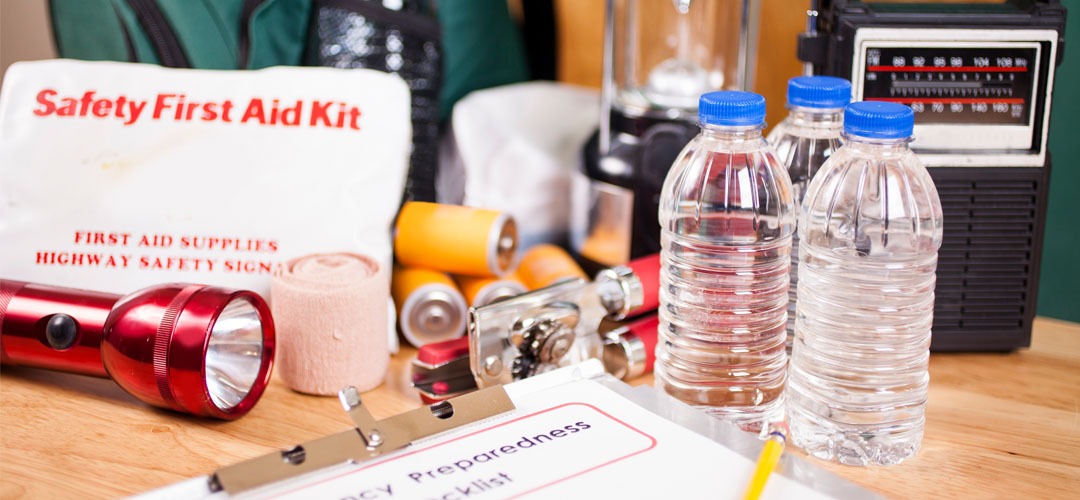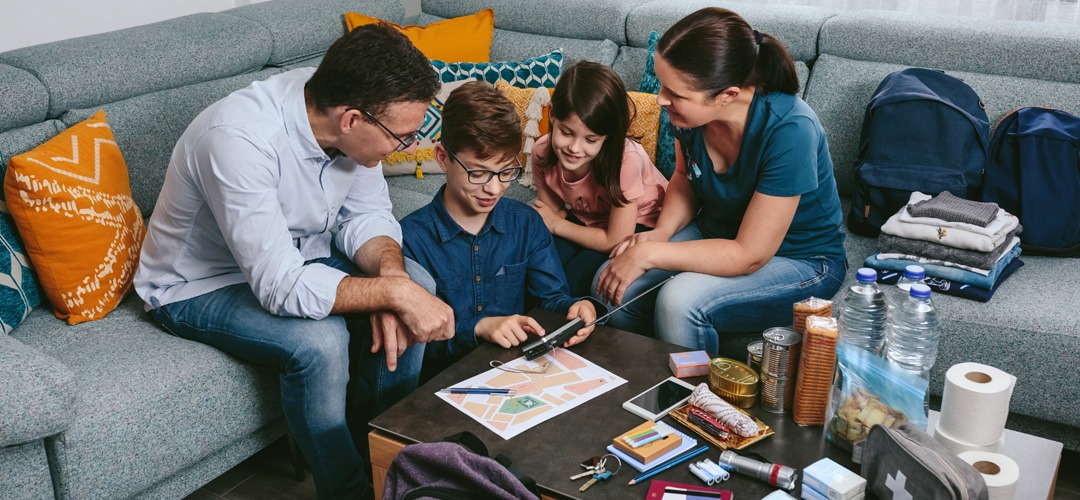
Jun 15, 2025 | Safety and Security, Storms and Outages
When the unexpected happens, whether it’s a severe storm, power outage or another emergency, having a well-stocked emergency kit can help you and your family stay safe and comfortable.
What to pack in your emergency kit
- Flashlights and batteries
Keep flashlights in several rooms of your home, and make sure you have extra batteries. Flashlights are safer than candles, especially during outages.
- Food and water
Stock at least a three-day supply of non-perishable food items like canned goods and granola bars. Don’t forget a manual can opener. You’ll also need one gallon of water per person per day for drinking and basic hygiene.
- First-aid kit
Make sure your kit includes bandages, antiseptic wipes and any prescription medications your family needs. Include over-the-counter items like pain relievers and allergy medicine.
- Battery-powered or hand-crank radio
Staying informed is key. A battery-powered or hand-crank radio lets you hear important updates when the power is out. Keep extra batteries on hand.
- Blankets and warm clothing
Pack seasonal clothing and extra blankets or sleeping bags. Even in warmer months, a blanket can provide comfort and protection if you lose power.
- Hygiene items
Include hand sanitizer, wet wipes, toothbrushes, toothpaste, deodorant and other basic items. For families with babies or toddlers, don’t forget diapers and baby wipes.
- Important documents
Store copies of key documents like insurance policies, ID cards and medical information in a waterproof container. It’s also helpful to have a printed list of important phone numbers.
- Portable phone charger
Make sure you have a portable charger to keep your phone powered if the electricity goes out. Keep it charged and ready to go.
Where to keep your kit
Place everything in a large, sturdy container like a plastic bin or duffle bag and store it in an easy-to-reach spot. Let everyone in your household know where it is and what’s inside.


Jun 8, 2025 | Safety and Security, Storms and Outages
Does your family have an emergency plan in case of severe weather? You might be surprised to learn that a lot of Americans don’t have an emergency plan.
We take a lot of steps to keep our loved ones safe. We childproof our homes, buckle up in the car and install smoke detectors. But are we ready for an emergency, like a power outage or a severe summer storm?
What would your family do if the power went out for days during a heat wave? Do you have enough food, water and other supplies? Every family’s needs are different, and your plan should reflect that. For example, families with young children, pets or someone with medical needs might require more detailed planning.
Why planning matters
Having a plan in place before summer storms hit can make all the difference. It’s much easier to stay calm and focused when you’ve thought through the details ahead of time. Knowing where to go, who to contact and what to have on hand will help you keep your loved ones safe.
With storm season approaching, now is a great time to review and update your emergency plan. Even if you already have a plan, it’s important to make sure it still meets your family’s current needs.
Get started on your plan
If you don’t have a plan yet, now is the perfect time to create one. Here are a few questions to ask yourself:
- Does everyone know who to contact and where to go if a summer storm hits when you’re not home?
- Do you have an emergency kit with enough supplies for at least three days?
- Does everyone know how to stay informed with the latest weather alerts?
Resources to help you prepare
We’ve gathered essential information from trusted sources like FEMA, the U.S. Department of Homeland Security, the Red Cross and the U.S. Department of Health & Human Services to create a comprehensive guide just for you. Our guide brings together the best practices and recommendations from these expert organizations into one convenient place, making it easy for you to review and follow.
Key tips:
- Keep a paper copy of your emergency contacts: If your phone dies during a storm, you’ll still have access to important numbers.
- Use our checklist to build your emergency kit: It’s designed with all the details you need to be prepared for summer weather emergencies.
- Teach your kids what to do during a storm emergency: Help them stay calm and know what to expect.
Download our Emergency Preparedness Guide
Check out the infographics below for more detailed guidance on creating your emergency kit and preparing your family. Being prepared for summer storms is essential, not just for yourself, but for everyone who depends on you.


Sep 18, 2024 | Safety and Security, Storms and Outages
September is Emergency Preparedness Month, and there’s no better time to make sure you and your family are ready for the unexpected. When disaster strikes, having a well-stocked emergency kit can make all the difference.
Kit Essentials
1. Flashlights and Batteries
Make sure you have flashlights for everyone in your family and plenty of extra batteries. Flashlights are safer than candles, which can be a fire hazard. Keep a flashlight in each room so you don’t have to search for one in the dark.
2. Food and Water
You’ll want to have enough food and water to last at least three days. Choose non-perishable foods like canned goods and granola bars—things that don’t need to be refrigerated and don’t forget to include a manual can opener. For water, plan on having one gallon per person per day. That’s enough for drinking and basic hygiene.
3. First Aid Kit
Accidents can happen. Be sure to have a first aid kit that includes bandages, antiseptic wipes, and any prescription medications your family might need. It’s also a good idea to have some over-the-counter medicines like pain relievers and allergy medicine.
4. Battery-Powered or Hand-Crank Radio
Staying informed is important during an emergency. A battery-powered or hand-crank radio will help you stay informed. Make sure you have extra batteries for the radio, too!
5. Blankets and Warm Clothing
Be prepared for various seasons and temperatures. In winter, you’ll need to stay warm. Keep extra blankets, sleeping bags, and warm clothing like hats and gloves in your kit. Even in warmer weather, a cozy blanket can make a tough situation more comfortable.
6. Hygiene Items
Staying clean is important, even during an emergency. Pack some hand sanitizer, wet wipes, and basic hygiene items like toothpaste, toothbrushes, and deodorant. If you have babies or young children, don’t forget diapers and baby wipes.
7. Important Documents
It’s a good idea to keep copies of important documents in your emergency kit. This could include things like insurance policies, birth certificates, and a list of important phone numbers. Store them in a waterproof container to keep them safe.
8. Portable Phone Charger
You’ll want to stay connected, so make sure you have a portable phone charger in your kit. Keep it charged and ready. Putting It All Together
Once you’ve gathered everything, store your emergency kit in a large, sturdy container like a plastic bin or a duffle bag. Keep it in a place that’s easy to reach and let everyone in your family know where it is.
That’s it! With your emergency kit ready to go, you’ll be prepared for anything. Stay safe, and let’s be ready for whatever comes our way!





